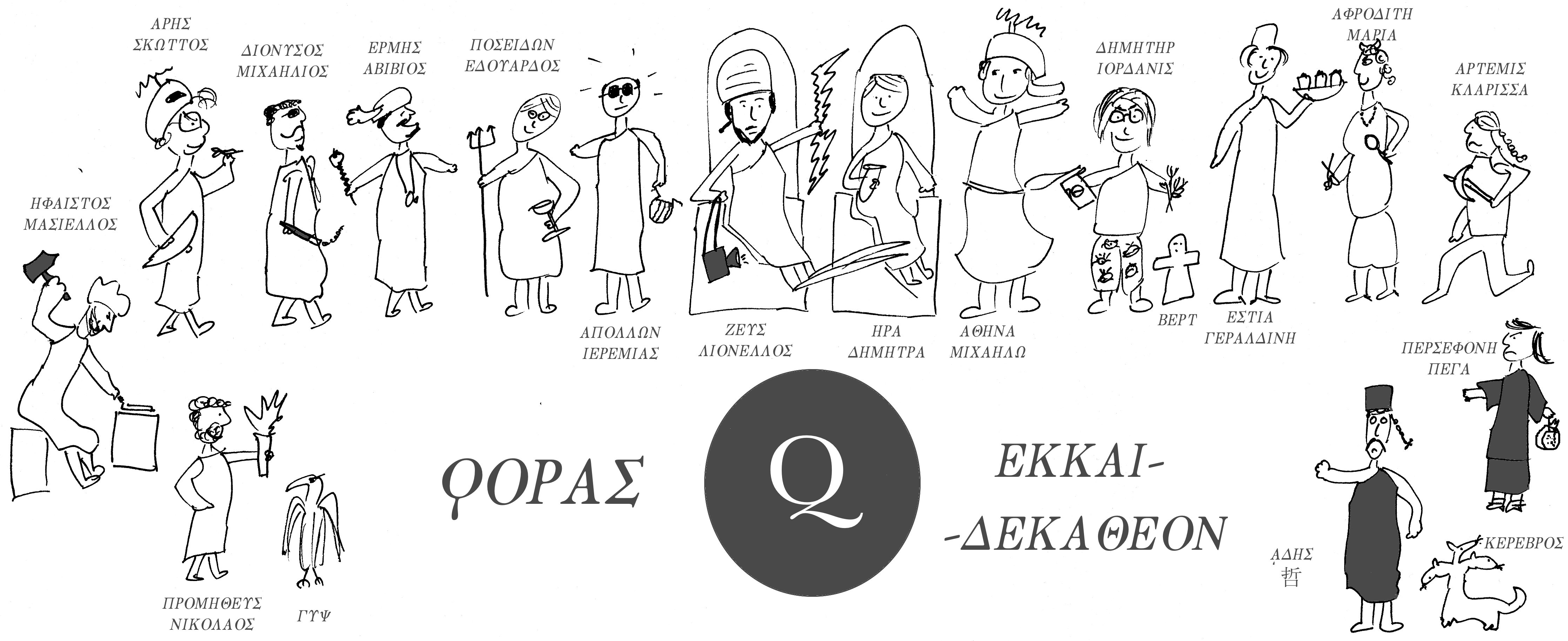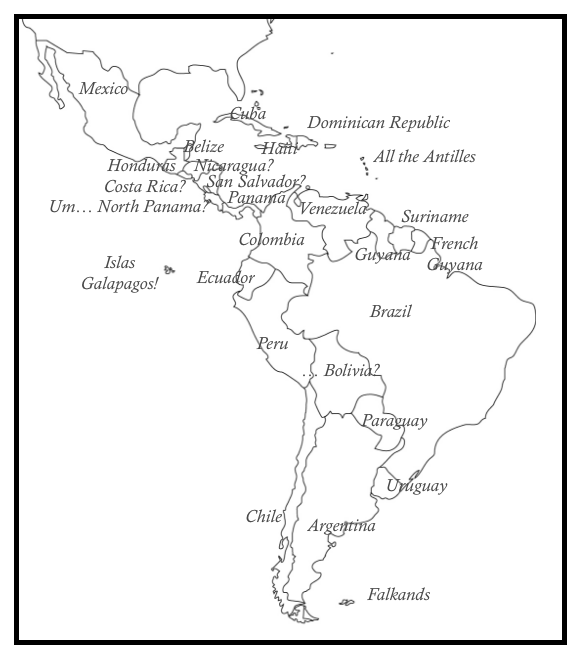In a roundabout way: syllabus is ultimately derived from a garbling of the obscure Greek word sittyba, which got mangled progressively in manuscripts and then print editions of Cicero, and reinterpreted from its original meaning “title slip”.
How different are the varieties of the modern Greek language (i.e. Demotic, Pontic, Cappadocian, etc)?
I’ve answered variants of this question elsewhere:
- Nick Nicholas’ answer to Does the Greek language have a variety of regional dialects?
- Nick Nicholas’ answer to Which language is closest to Greek?
- Nick Nicholas’ answer to How different are the dialects of your mother tongue within your country?
- Nick Nicholas’ answer to Are there any dialects of Greek acknowledged to be unintelligible to mainstream Greek within Greece itself?
Can someone write in their language using it’s grammatical structure while still using English words?
(Modern Greek > English)
If it is possible! You hear there, “It can someone to write in the language theirs using the grammar theirs but English words?” Hey not you us quit? For what you us passed, for revue? Not will I sit to you make theatre the how I speak, so you to break slab! Elsewhere these! Not they have slaughtered! Hey shoo!
Well I never! The nerve, “Can someone write in their language using their grammar but English words?” Why don’t you leave me alone! What do you take me for, a performing monkey? I’m not going to sit around making a show of how I speak for your amusement! Tell it to someone else! It ain’t happening. Get lost!
The Quora Hekkaidethatheon
Nick Nicholas’ answer to If famous writers on Quora were Greek gods, who would they be?
Wherein I enumerated my favourite Quorans as Greek Gods.
Alfredo Perozo pointed out in comments:
I feel this would make a nice cartoon… just saying.
https://www.quora.com/If-famous-…
Finally done. I was going to do a fancy cartoon with layers and a tablet, but this came out eventually, instead.

I’ll provide transliterations from the bottom clockwise. I added myself in after Dimitra Triantafyllidou’s answer and Edward Conway’s answer.
- Hekkaidekatheon [Sixteen Gods] of Qora
- Gyps [vulture]
- Promētheus Nikolaos Nick Nicholas
- Hēphaistos Masiellos Michael Masiello
- Arēs Skōttos Scott Welch
- Dionysos Michaēlios Michaelis Maus
- Hermēs Habibios Habib Fanny
- Poseidōn Edouardos Edward Conway
- Apollōn Ieremias Jeremy Markeith Thompson
- Zeus Lionellos Lyonel Perabo
- Hēra Dēmētra Dimitra Triantafyllidou
- Athēna Michaēlō McKayla Kennedy
- Dēmētēr Iordanis Jordan Yates
- Bert
- Hestia Geraldinē Gigi J Wolf
- Aphroditē Maria Mary C. Gignilliat
- Artemis Klarissa Clarissa Lohr
- Persephonē Pega Pegah Esmaili
- Kerberos
- Hāidēs Jer Jay Liu
If Santa had Quora, what questions would he ask?
Didn’t I already answer this?
Oh. I didn’t: Nick Nicholas’ answer to If Satan had Quora, what questions would he ask?
- Why is my name so close to Satan? Am I Satan? Does OP think I’m Satan?
- I mean, I’m dressed in red, and my reindeer have horns…
- Am I St Nicholas?
- Am I St Basil of Caesarea?
- Am I the Christ Child?
- Am I related to the Three Wise Men?
- Am I Jólnir, aka Odin? (Have a Merry Viking Christmas – Wild Eyed Southern Celt)
- Do I owe Coca Cola royalties?
- What is NORAD?
- Why is NORAD tracking me?
- Are NORAD going to shoot me out of the sky?
- How can I best stop a reindeer’s nose from glowing while flying?
- What is the weather like in Rovaniemi in July?
- Where exactly do I live? The North Pole, Drøbak, Uummannaq, Tomteboda, or Rovaniemi? (Santa Claus : Home – Wikipedia)
- If I live on the North Pole, am I actually Canadian?
On 23 December 2008, Jason Kenney, Canada’s minister of Citizenship, Immigration and Multiculturalism, formally awarded Canadian citizenship status to Santa Claus. “The Government of Canada wishes Santa the very best in his Christmas Eve duties and wants to let him know that, as a Canadian citizen, he has the automatic right to re-enter Canada once his trip around the world is complete,” Kenney said in an official statement.
- Is Justin Trudeau still permitting me to reenter the North Pole?
- Do I have to be extra polite and apologetic now as a Canadian?
- Who was Virginia anyway? (Yes, Virginia, there is a Santa Claus – Wikipedia)
- Why are there no chimneys around any more?
- How did I ever fit in the chimneys?
- What do you mean, Odin used to enter through chimneys and fire holes on the solstice? Wikipedia says “citation needed”.
- Is there still time for me to go surfing after Christmas in Australia? What’s the weather like in Bondi Beach?
- Why do Calvinists hate me?
- Why do Christian Scientists hate me?
- Why do communists hate me?
- Why do child psychologists hate me?
- OK, OK, geez! Some child psychologists.
- Survey Question: Have you been naughty or nice?
How many words does the Greek language have?
I wrote an extensive set of blog posts in 2009 under Ἡλληνιστεύκοντος (read them backwards), trying to deal with this question with a fixed(ish) corpus, that I was responsible for lemmatising: the TLG. It has a whole lot about the distinction between word tokens (individual instances of words), wordforms, and lemmata (dictionary words).
It starts with several posts about how pointless this question is. Which noone seems to pay attention to.
The count of lemmata for the Corpus in the TLG (ancient and mediaeval literature) plus PHI (inscriptions) was 214,000 in 2009. By the time I was terminated from the TLG in 2016, I had gotten recognition up to 240,000 lemmata.
For the strictly classical corpus, up to the 4th century BC, it was 66,000.
If we add Modern Greek and Modern Greek dialect, it’ll be more. I’ve seen a guess by Christophoros Charalambakis, director of the Historical Dictionary of Modern Greek (dialect dictionary) at the Academy of Athens, of 600,000. I think that’s implausible. Given Zipf, I think 350,000 to 400,000 for all periods of Greek is plausible.
OED has something like 600,000 for English.
How many Central and South American countries can you identify on a map?
Sam, this… this is not going to be good.

Central America:
- Missed Guatemala
- Put Honduras where Guatemala should have been
- Put Nicaragua where Honduras should have been
- Put Costa Rica where El Salvador should have been
- Put El Salvador where Nicaragua should have been, and renamed it San Salvador
- Called Costa Rica North Panama. Yes, I knew that was wrong.
- Didn’t even try to place the Bahamas, Jamaica, Puerto Rico, or, like, any of the individual Antilles.
- So… yeah, ¡no bueño! ¡Desculpate me, amigos centralamericanos!
South America:
- … Holy smokes, I got it right! There was a little hesitation with Uruguay/Paraguay and Colombia/Venezuela, and I almost called Bolivia South Panama. Phew.
How many Asian countries can you identify on a map?
OK. I know I’m going to do badly with Central Asia.

- Middle East: Yup.
- South: Yup.
- South East: Yup. I momentarily misplaced Laos, but I found it again.
- East: Yup.
- North: Yup
- Central: … OK.
- I got Kazakhstan and Uzbekistan.
- I rotated Turkmenistan, Kyrgyzstan, and Tajikistan. Oh well.
Why do the English say “leftenant” and the Americans say “lootenant” when the spelling of “lieutenant” indicates a pronunciation like “lyewtenant”?
The American “lootenant” is easy: it’s a general rule of American English that [ju] after alveolar consonants is reduced to [u]: news, tune = nooz, toon. In British English, they are nyooz, tyoon. (And there is variation within American English.)
The lack of a French pronunciation is also regular: French ieu is rendered in English as -(y)oo. Thus in lieu of; adieu.
The oddity is the left- pronunciation. This is what the Oxford English Dictionary says:
The origin of the β type of forms (which survives in the usual British pronunciation, though the spelling represents the α type) is difficult to explain. The hypothesis of a mere misinterpretation of the graphic form (u read as v), at first sight plausible, does not accord with the facts.
I.e. that people misread lieutenant as lievtenant.
In view of the rare Old French form luef for lieu (with which compare especially the 15th cent. Scots forms luf– , lufftenand above) it seems likely that the labial glide at the end of Old French lieu as the first element of a compound was sometimes apprehended by English-speakers as a v or f.
Meaning, the unfamiliar French liøtenã, with a breathy pronunciation, could have been misheard in England as lyeftenant, a spelling present alongside leuetenant since the Middle Ages.
Possibly some of the forms may be due to association with leave n.1 or lief adj.
i.e. Folk etymology.
In 1793 Walker gives the actual pronunciations as /lɛv-//lɪvˈtɛnənt/, but expresses the hope that ‘the regular sound, lewtenant’ will in time become current. In England this pronunciation /ljuːˈtɛnənt/ is almost unknown. A newspaper quot. of 1893 in Funk’s Standard Dict. Eng. Lang. says that /lɛfˈtɛnənt/ is in the U.S. ‘almost confined to the retired list of the navy’.
So the old, predictable pronunciation had died out in England; the spelling survived, and it may be that either the old pronunciation survived in the US, or was revived as a spelling pronunciation.
Do any popular Quorans ever delete their answers?
Can I be a popular Quoran? I’ve got 1200 followers, so by the Villines Tiers (Eric Villines’ answer to What are the different “tiers” of Quora writers (related to number of views)?), I should be.
Never.
All of you who have done so appear to be working under a notion that Quora is all about giving the best possible answer, and if your answer is not as good as someone else’s, it should be forfeit.
I don’t think about it that way. I’m far too arrogant, and far too in love with my own voice.
My Quora answers are my journey. If they turn out wrong, that gets worked out in comments, and I’ll occasionally update or edit my answer to reflect improved understanding. But rescind an answer? The notion horrifies me.
The only time I ever deleted an answer of mine was one my most popular early answers, which was a mere list of hyperlinks to related answers. It should have been an Answer Wiki (I didn’t know what they were back then), and I turned it into one.